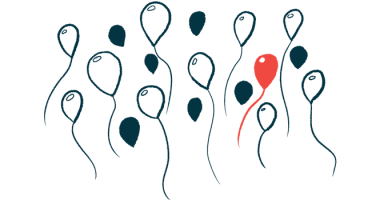New HMBS Mutation ID’d in Woman With Pregnancy-triggered AIP
Acute intermittent porphyria attack follows uneventful pregnancy and birth

A new mutation in the HMBS gene was found to be the cause of acute intermittent porphyria (AIP) in a Chinese woman who experienced symptom flares related to an unexpected pregnancy, a case study reported.
“This case contributes to the existing knowledge on AIP and its causative genetic mutations,” the researchers wrote.
The case study, “Novel hydroxymethylbilane synthase gene mutation identified and confirmed in a woman with acute intermittent porphyria: A case report,” was published in the World Journal of Clinical Cases.
Hormonal changes could trigger acute intermittent porphyria flare
AIP, caused by mutations in the HMBS gene, is characterized by sudden attacks of symptoms. Changes in hormone levels related to menstruation and pregnancy can play a role in triggering AIP attacks.
Researchers described the case of a 22-year-old Chinese woman who developed severe pain in her abdomen and lower back without any obvious cause. Her pain symptoms worsened over a few days and she experienced an epileptic seizure and weakness in her lower limbs.
Upon hospital admission, she was found to have high blood pressure. She was also found to be pregnant unexpectedly. Months earlier, she had given birth to a baby uneventfully.
Blood and urine tests were generally indicative of porphyria, prompting genetic testing. Results showed a mutation in the HMBS gene. This specific mutation, called c.648_651+1delCCAGG, had never been documented before, but further lab testing and computer analysis indicated that it was likely disease-causing.
“The patient was ultimately diagnosed with AIP,” the researchers wrote, adding that 504 mutations previously have been identified in the HMBS gene.
Additional testing showed that several of the patient’s biological relatives — her father, uncle, brother, and son — also carried the same AIP-causing mutation.
“Of the male [mutation] carriers, two experienced irregular abdominal pain and constipation (her father and uncle), while two others (her younger brother and son) experienced no clinical symptoms,” the researchers wrote.
The woman was started on a high-glucose diet, which somewhat eased her abdominal pain.
During her hospital stay, she experienced spontaneous vaginal bleeding and, upon evaluation, was found to have had a miscarriage. Her symptoms resolved with the end of the pregnancy.
Several months later, the woman had another unplanned pregnancy, and her symptoms reappeared. She decided to undergo an elective abortion to terminate the pregnancy, which again ended all of her symptoms.
She has been advised to continue on a high-sugar diet and to utilize effective contraception to avoid unplanned pregnancies. As of the latest follow-up, she has not had any more symptoms.
“We provided the mutation carriers a clearer picture of their condition and provided recommendations on how to prevent potentially life-threatening acute episodes,” the researchers wrote.







